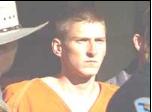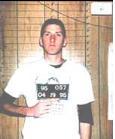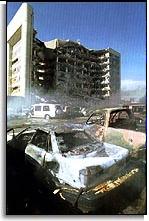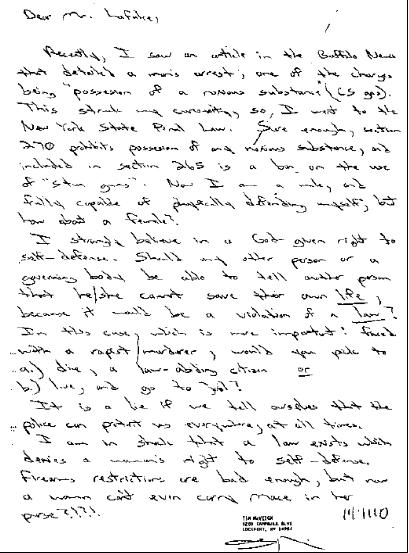 |
We have Trained Handwriting Experts in Over 17 Countries Worldwide through our home study courses. |
Timothy McVeigh - Did the Handwriting Warn Us? Written by Guest Author Mark Dehe
Alcohol, Tobacco, and Firearms (ATF) agents had surrounded the Mount Carmel Center in Waco, Texas, home of the Branch Davidians, a religious community headed by David Koresh. ATF agents, having previously served warrants on the Branch Davidians because of suspected illegal weapons stockpiling, ended a months-long standoff by storming the compound. In the process, 88 members were killed and the compound itself was burned to the ground. Watching these events unfold at his friend Terry Nichols' farm in Decker, Michigan, Timothy James McVeigh was enraged. So incensed was he by this obvious "suppression of human rights" that he felt the need to take action. McVeigh was, at the time of the Branch Davidian raid, a 25-year-old decorated Desert Storm veteran who had a passion for firearms and an overwhelming respect for the right to bear arms. For many months, McVeigh had maintained a close eye on the events at the Branch Davidian Compound as they unfolded. He even went so far as to journey to Waco, Texas to pass out pamphlets and lend his support as needed. This was the catalyst McVeigh needed; the figurative straw that broke the camel's back. At the time, however, he was unsure of what course of action he should take. Nevertheless, as vague plans began to formulate, he began to enlist the aid of two friends whom he met during his tour with the Army, Terry Nichols and Michael Fortier.
It was Terry and his brother James, with whom he stayed for a while, who taught McVeigh the art of making explosives out of easy-to-acquire materials. Adding fuel to McVeigh's fire, new laws had recently taken effect that had stopped, or severely hampered, the manufacture of a variety of weapons, to include semi-automatic rifles and handguns. And, while he as yet had no clear plan on how to strike at the heart of the government, this would soon pass. The Turner Diaries, written by William L. Pierce, himself a former American Nazi Party Leader, was to have a most profound impact on McVeigh's life. "The Turner Diaries" told the story of a man who responded to current gun control laws by blowing up the Washington FBI building with a truck bomb. After having read The Turner Diaries, McVeigh now knew exactly what to do and how to go about doing it. To Timothy McVeigh and Terry Nichols, this was the answer they were looking for. The perfect way to deliver a powerful message with the most impact. McVeigh contacted his friend, Fortier, and told him of his and Terry's plan to blow up an as-yet-unidentified federal building. Fortier told McVeigh he would have nothing to do with this plan. Unfortunately, this did little to deter McVeigh or Terry. For the next several months, the two constructed bombs and stored their deadly cargo in rented storage lockers. To finance their project, McVeigh stole over $60,000 worth of guns and valuables from a gun collector he had met several months earlier at a gun show. Fortier's involvement, which at this point was minimal, became more complicated when McVeigh arrived at his home with the stolen explosives. McVeigh explained his plan - even going so far as to explain to Fortier's wife how the explosive drums would be stored in the truck for maximum impact. On April 19, 1995, the second anniversary of the siege at the Branch Davidian compound, Timothy McVeigh prepared for his deadly mission by wearing his favorite T-shirt. On the front was a picture of Abraham Lincoln. Underneath this picture were the words "Sic Semper Tyrannis" which translates to "Thus Ever to Tyrants." These are the words spoken by John Wilkes Booth just prior to shooting President Lincoln.
McVeigh chose the Alfred P. Murrah building in downtown Oklahoma City, Oklahoma because he assumed that ATF agents worked there. And to an extent, he was correct. The Murrah building housed a number of federal agencies to include the ATF, Veteran's Affairs, Social Security Administration, Housing and Urban Development, as well as the Secret Service. On that fateful day just before 9 AM, a yellow Ryder rental truck made its way through the streets of downtown Oklahoma City, coming to rest directly in front of the Alfred P. Murrah building. Very calmly and nonchalantly, the driver stepped from the rental truck and walked away.
At 9:02 AM the truck's cargo erupted in an enormous explosion which ripped through one-third of the federal building, killing 168 men, women and children and wounding more than 500 others. Employees in buildings blocks away were reportedly thrown from their chairs. The blast was felt and heard as much as 30 miles away.
Approximately 75 miles from the now-destroyed federal building, Timothy McVeigh was stopped at 10:20 AM by Oklahoma Patrol Officer Charlie Hanger on a routine traffic violation on Interstate 35, in Perry, Oklahoma. He was stopped for speeding and because the 1977 Mercury Grand Marquis he was driving did not have any license plates. While his role in the mass murder was unknown at this point, McVeigh would never see freedom again.
Co-conspirator Terry Nichols is currently serving life in prison for his role in the bombings. Michael Fortier, who received the lightest sentence of the three, is currently serving 12 years for failing to warn authorities of McVeigh's plan. McVeigh's execution, originally planned for May 16th, was postponed until June 11 due to an apparent oversight by FBI officials. To the surprise and dismay of an entire country, over 4000 pages of information were kept from McVeigh's lawyers. It was later determined that the previously-undelivered documents were not relevant to McVeigh's guilt or innocence. Within the last 12 hours of his final day of life, McVeigh spent much of that time asleep; his last meal consisted of two pints of mint chocolate chip ice cream. Just prior to 7AM he made his way onto the gurney and was strapped into place. With intravenous lines inserted into his arms, he said nothing, staring defiantly into the cameras as he slipped into unconsciousness and soon after, death. He was pronounced dead at 7:14 AM, his eyes still wide open. Shortly after that the transmission broadcasting his demise went dark and the saga of Timothy James McVeigh, possibly the most hated man in the United States, came to an end.
Personality Breakdown of Timothy McVeigh Despite the overwhelming severity of his crimes, Timothy McVeigh is neither psychotic nor insane. Neurotic perhaps, but not psychotic. His handwriting reveals that he has the ability to concentrate intensely on whatever has gained his interest. The ability to concentrate by itself doesn't guarantee intelligence but it does allow the writer the ability to tune out all outside stimulus, providing them the ability to concentrate completely and with little to no interruptions. Another positive trait is his ability to pass through most situations without giving them a second thought. What would anger most people will just pass right under Tim without causing him to lift so much as an eyebrow - normally. The problem begins in the slant of his handwriting, which possesses an obvious left-hand slant. This suggests that he has a personality that is becoming increasingly withdrawn from society. He is unable to express his anger or passion in a socially acceptable manner and so keeps it buried deep within him. The fact that McVeigh has such an easygoing personality has probably worked to his advantage for many years. Nevertheless, this only gets a person so far. A person like McVeigh who has a withdrawn personality will keep things bottled up tightly until finally they will blow up, usually violently, and the receiving party will not understand where any of it came from - as though it came from "out of nowhere," when in actuality it had been simmering just under the surface for quite some time. McVeigh also possesses two characteristics that, because of their contradictory nature, create a dangerous combination. McVeigh is a very proud person. He does not like to be spoken down to, nor does he wish to be disrespected in any way. If he does feel that his pride has been wounded in any way, he will take whatever means he feels necessary to rectify the situation. At the same time, however, he has fairly low self-esteem. Subconsciously he does not feel he is worthy of respect. A person with low self-esteem will stay in bad situations or relationships longer than normal because he feels that as bad as the situation may be, it could always be worse and so he's better off where he is. In McVeigh's case, the danger of having low self-esteem and intense pride is that he will often go out of his way to ensure he is treated correctly. He may speak the loudest about things he knows the least about. He demands respect from others, even though he subconsciously doesn't feel worthy of that respect. Taken a step further, when combined with his withdrawn personality, he will probably not openly express his anger, but he will remember the affront and take steps necessary to correct the situation, although probably not in a direct confrontation. Mcveigh also possesses a dominating character. He prefers to be in control. This blends slightly with his "pride" characteristic. These traits could very well stem back to his military days when he was provided unique skills and training. This in itself is not necessarily a negative trait and can often be used with positive results. McVeigh's overwhelming characteristics are those revealing his withdrawal from society. First off, like most males, McVeigh prints, reflecting his need for privacy. Most men are taught at an early age to suppress their emotions - never let them see you cry. McVeigh, however, in addition to his privacy, has a very obvious backward slant to his writing. As I have mentioned, he is withdrawing from society. This type of person cannot openly express his anger or his happiness. He keeps everything bottled up. Similar to a tea kettle, his anger and other mixed emotions will continue to build and build until they're released in an explosive expression of his feelings. This type of person will rarely vent their anger on the person or persons responsible for its presence, but he will remember each and every attack and plan accordingly. McVeigh's handwriting also reveals that of a loner. Generally speaking, the person with this trait could very well be the life of the party, but will prefer solitude so they can unwind. In McVeigh's case, added to his other traits, he truly is a loner. He feels that very few people, if anyone, really understands him and he prefers isolation to socializing. If you notice, McVeigh's words are spaced far apart from each other, revealing his alienation from society. He doesn't feel as though he fits in. Compounded by his loner mentality and withdrawing personality, here is a person that has no need for human interaction, and therefore may feel that society�s rules do not apply to him. Lastly, we have his signature. A person�s signature determines how they want the world to see them. McVeigh's signature is unrecognizable, whereas the text of his letter is not. Timothy McVeigh is a person that wants to communicate his thoughts and ideas but not who he is. He wants everybody to hear him but doesn't want anybody to see him. Mark R. Dehe is a Certified Handwriting Analyst and can be reached via e-mail or phone at: Big 'ol CONGRATS go out to two of our students who were just accepted into Handwriting University's School of Forensic Document Examination: If you would like to become a court qualified document examiner and build a career where you can earn one thousand bucks a day, you'd better put your application in now - there are only 20 slots available, and two more were just filled! Time is running out - visit the website and submit your application today. The next class starts in the Fall: PLUS: We have TWELVE newly certified graduates - eleven of them from Handwriting University, India.
Sharon Hampton, of Noblesville, IN received her graduation certificate at the recent Handwriting University International Conference in Dallas, TX. The following graduates will be receiving their certificates at a graduation ceremony in Bangalore, India: Mr. PKR Kumar Ms. Raksha Jain, a high school student, If you would like to become a Certified Handwriting Analyst, check out the latest deals on our courses: |
http://www.myhandwriting.com/learn Five Free Special Report available here: |
On-Line Catalog | Free Graphology Special Report | Hire a Handwriting Expert | Live Seminars | Become A Certified Handwriting Expert | Hire an Expert in California| Learn Handwriting Analysis for Free Free Handwriting Analysis Self-Test | Hire a Local Handwriting Expert | Free Graphology Newsletter | Top of Page | Questions: Call 1-310-684-3489 |









